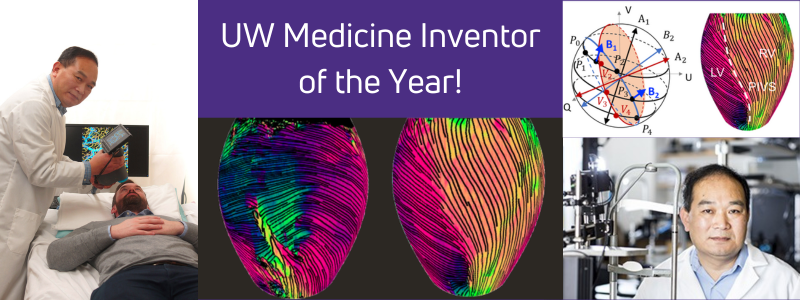Ruikang (Ricky) Wang, UW professor of bioengineering and ophthalmology, received the 2023 UW Medicine Inventor of the Year award and will be honored at a reception on November 1, 2023, 5:00 to 7:30 p.m. The Award recognizes outstanding UW scientists whose inventions have had a major impact on both human health and our local economy. The selection committee considers the following criteria when choosing the awardee:
- Number of lives saved or improved
- Biomedical impact of the invention
- Contribution to the bioscience sector
- Contributions to the UW CoMotion mission to extend the impact of the UW research through the creation of partnerships that encourage investment in innovation
- Contributions to the UW School of Medicine faculty community
Wang holds the George and Martina Kren Endowed Chair in ophthalmology research at the UW. His laboratory is responsible for the invention of optical coherence tomography angiography (OCTA, or optical microangiography), an imaging technique capable of 3D imaging of blood flow within microcirculatory tissue beds in vivo. He has published extensively on this topic, including demonstrations of the use of OCTA to capture images of retinal, cerebral cortical, cochlear and skin blood flow, and oral cavity, without a need for contrasting dyes. The technique has been translated for use in clinical ophthalmology, making a meaningful impact on saving patient vision.
His laboratory has also made important contributions to the current development of cellphone-based smart healthcare, where they invented a low-cost technique to create hyperspectral imaging on unmodified smartphones. Hyperspectral imaging is a technique that analyzes a wide spectrum of light instead of just assigning primary colors (red, green, blue) to each pixel. This innovation will enable widespread use by the public due to the expanding use of smartphones in our daily life.
In announcing the 2023 award, Shelly Sakiyama-Elbert, UW professor of bioengineering and vice dean of the UW Medicine Office of Research and Graduate Education, noted that the Award “recognizes the breadth and quantity of [Wang’s] commercial licensing successes spanning a broad range of possible paths to translation including low-cost, high quantity express licenses for copyright materials, exclusive licensing to established companies, and startup ventures of [his] own.”
Princess Imoukhuede, Hunter and Dorothy Simpson Endowed Chair and professor in UW bioengineering wrote in an email to the BioE community, “This remarkable recognition is a testament to Dr. Wang’s exceptional talent and groundbreaking contributions to the bioscience sector and to UW. His commercial licensing successes have both expanded the boundaries of translation and have the potential to positively impact numerous lives. We are incredibly proud to have such a brilliant mind among us.”



